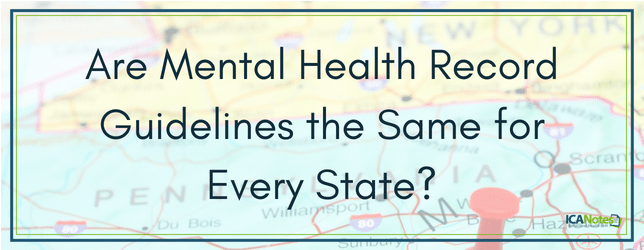Are Mental Health Record Guidelines the Same for Every State?
Since 1996, when the U.S. Congress enacted the Health Insurance Portability and Accountability Act — commonly known by its acronym HIPAA — the federal government has stepped up its role in mandating both mental health confidentiality laws and electronic health record regulations. However, while the federal government has been setting and enforcing certain minimum standards for patient privacy laws, individual states have been free to enact more stringent laws — especially when it comes to the keeping, sharing and general management of mental health records.
That’s why, in any instance where a behavioral health practitioner is in doubt over a mental health record guideline, he or she should never assume that simply following HIPAA regulations is sufficient.
As state laws vary widely and are frequently updated, it should also be noted that any following references to state laws are merely for the purpose of illustrating points and should not be taken as legal advice.
In all circumstances, behavioral health practitioners are best advised to contact their state mental health agency for the most up-to-date laws and regulations. If you’re not sure where to begin, a good place to start this search is via the contact us page of the Substance Abuse and Mental Health Services Administration (SAMHSA), as well as the State Mental Health Authorities Directory published by SAMHSA.
Federal and State Roles in Mental Health
Depending on the state where you practice, mental health regulations can vary across a wide range of issues that can impact your patients’ mental health records. For instance, HIPAA regulations are clear about the normal day-to-day privacy rules regarding the need to obtain patient consent before sharing medical information with another provider or insurer. However, behavioral health professionals’ duty to warn regarding patients they believe may become violent is totally dependent upon the state where they practice.
Each state has its own expectations and laws. For instance, in 2013, the state of New York changed its law from permitting mental health professionals to warn of a potentially dangerous patient to make the warning part of the mandatory duty of all New York mental health practitioners. A good place to get an initial overview of a state-by-state description of behavioral health professionals’ duty to warn laws is with the National Conference of State Legislatures.
Another important factor to consider is your state’s minor consent laws as they apply to mental health services and the keeping of records. To illustrate, at least 31 states currently have laws on their books that permit minors to consent to certain mental health treatments and services. However, there are limitations on a state-by-state basis.
For instance, in California, minors who are 12 or older can give their consent for outpatient treatment for mental health issues if the behavioral health professional involved believes that the minor is mature enough and could present a danger to themselves or others if not treated or is the victim of abuse. The American Academy of Pediatrics has published a Confidentiality Laws Tip Sheet, which is a useful resource on the scope and importance of the many issues that arise at on state-by-state level.
Regardless of which state you practice in, it’s crucial to get the proper management of your patients’ mental health records right. For this reason, ICANotes was developed to be the most robust behavioral health EHR management tool on the market today. For a free trial or live demo, contact ICANotes today.
Related Posts:
How Electronic Health Records Are Improving Patient Care
Biggest Challenges Facing Clinical Psychologists in 2018
How to Give Patients Access to Their Mental Health Records
The Benefits of a Paperless Therapy Practice

